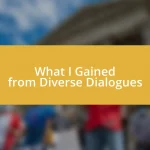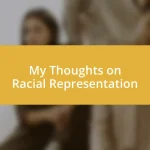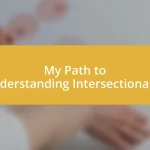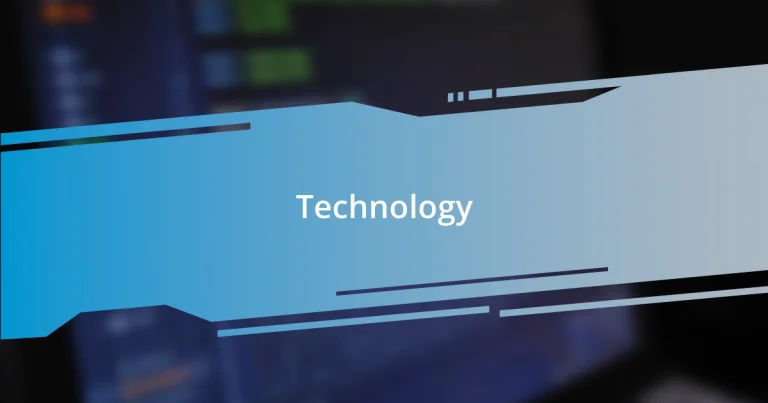Key takeaways:
- Representation shapes personal identity and societal perceptions, empowering individuals when they see themselves reflected in media and role models.
- Diverse voices enrich conversations, fostering empathy and creativity, and are essential for problem-solving in various contexts, including workplaces.
- Promoting inclusivity through mentorship, community events, and supporting marginalized creators can significantly enhance representation and understanding in society.
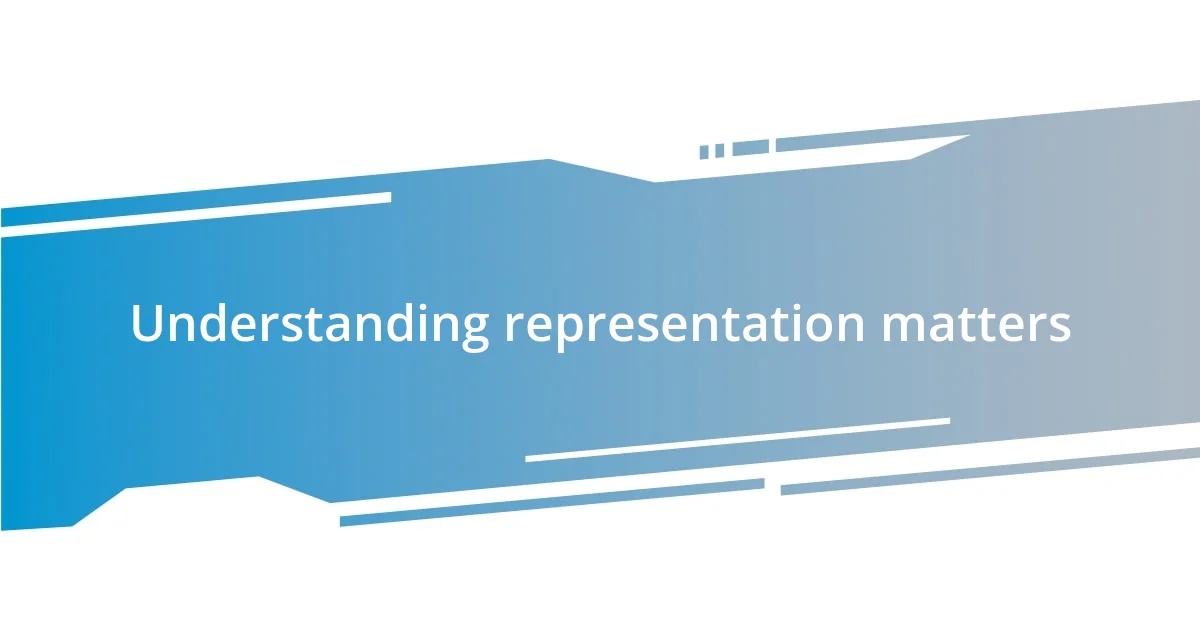
Understanding representation matters
Representation matters because it shapes how we see ourselves and the world around us. I remember watching a movie as a kid that featured a character who looked just like me. It was a small moment, but it made me realize that I too could be a hero in my own story. Can you recall a time when seeing yourself reflected in media changed how you viewed your potential?
When I got involved in community activism, I understood representation as more than just visibility; it’s about voice and power. I often sat in meetings where decisions were made, and it struck me how different perspectives could illuminate issues that others might overlook. How often do we truly listen to those who are typically sidelined, and what might change if we prioritized inclusivity in our conversations?
Moreover, the impact of representation isn’t just personal; it ripples through society. For instance, I’ve seen firsthand how diverse role models inspire younger generations to pursue their dreams. Have you ever considered how a single figure can transform aspirations for many? This highlights how essential it is for everyone to see themselves in various spheres—from politics to science—because representation can ignite hope and action.
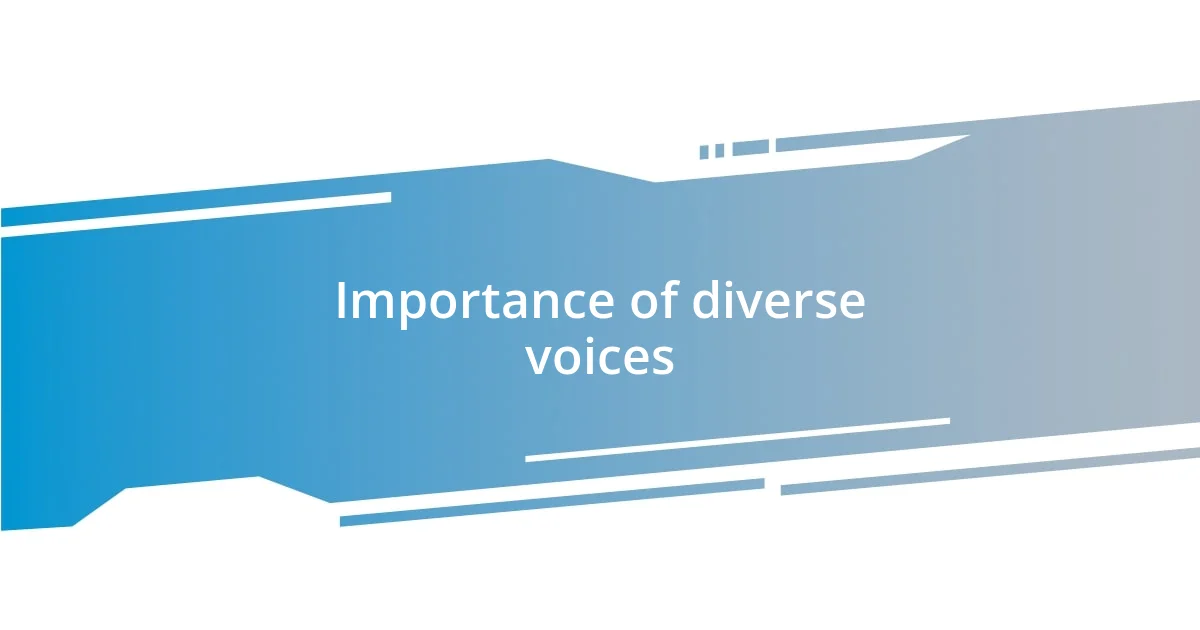
Importance of diverse voices
Diverse voices play a crucial role in shaping our understanding of the world. I once attended a panel discussion focused on climate change, featuring experts from various backgrounds. Their differing viewpoints not only enriched the conversation but also challenged the dominant narratives I had always heard. Isn’t it fascinating how a single issue can be seen through so many lenses?
When I entered the workforce, I was often the only person of my background in meetings. I quickly learned that when my colleagues shared their experiences, it brought valuable context to our projects. It highlighted for me how diverse voices can help us approach problems more creatively and compassionately. What if we embraced these diverse narratives more intentionally in our workplaces and communities?
The importance of diverse representation can also be seen in media and literature. Growing up, I felt a sense of empowerment when I read books featuring protagonists from different cultures. These stories helped me grasp the complexity of human experiences beyond my own, teaching me empathy and understanding. Have you thought about how diverse stories can broaden our horizons and foster connections among seemingly different groups?
| Diverse Voices | Impact |
|---|---|
| Different Perspectives | Enrich Conversations |
| Collective Strength | Empower Individuals |
| Broadened Narratives | Foster Empathy |
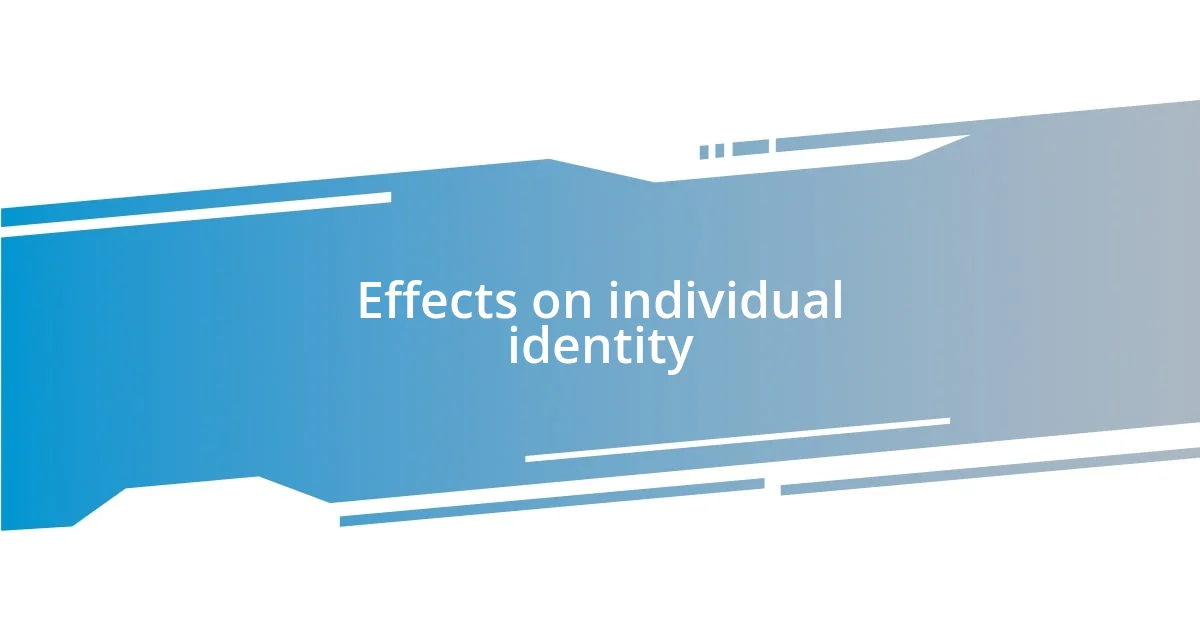
Effects on individual identity
Feeling seen and understood is an integral part of our identity formation. I recall a time when I attended a diverse gathering and saw how different identities interacted. It made me realize that my experiences were part of a larger narrative, and I felt a sense of belonging. This connection can be transformative, allowing individuals to embrace their uniqueness while understanding that they are part of a collective story.
- Identity is shaped by the representation we see around us.
- Diverse representations foster personal growth and self-acceptance.
- Inclusion enriches our sense of belonging, reinforcing our personal narratives.
When people from various backgrounds see role models who reflect their identities, it can change their self-perception. I remember chatting with a young artist who felt discouraged because she didn’t see anyone like her in the art world. However, when she stumbled upon an exhibition by artists of her background, her inspiration reignited. This impact illustrates how crucial it is for individuals to feel validated in their identity. These moments of recognition can shift attitudes, fostering self-confidence and ambition essential for personal development.
- Role models help to validate personal identity.
- Seeing one’s identity represented can inspire hope and aspirations.
- Recognition from the community reinforces individual empowerment.
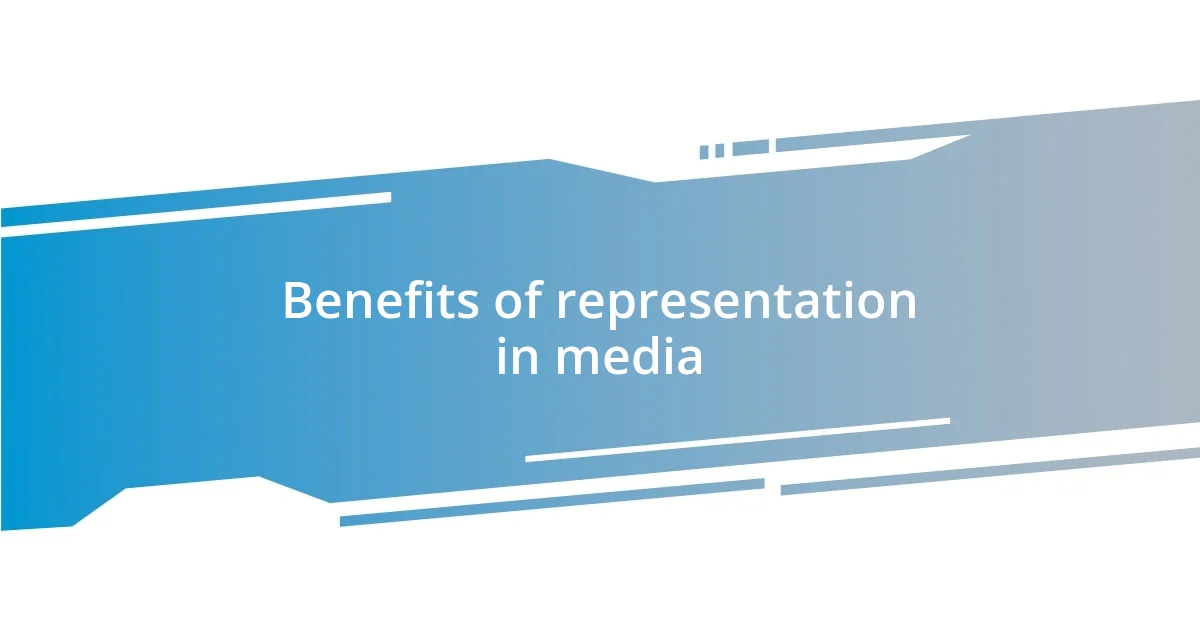
Benefits of representation in media
Representation in media offers profound benefits, not just for individuals but for society as a whole. When I first watched a film featuring a lead character who was a single mother, I felt an instant connection. It made me reflect on my own experiences and the struggles I’d faced. Seeing my reality portrayed on screen didn’t just validate my journey; it showed me that other people shared similar dreams and challenges, creating a sense of community and understanding.
Additionally, representation can ignite discussions that lead to real change. I remember attending a book club where we explored narratives written by authors from marginalized backgrounds. It opened my eyes to stories I had never considered, fostering empathy and deepening my understanding of societal issues. Have you ever found yourself reevaluating your perspective after encountering a story that strikes a chord? Those moments remind us of the power stories have in shaping our views and moving us toward a more inclusive society.
Moreover, diverse representation influences the aspirations of younger generations. I once spoke with a teenage boy who dreamed of becoming an engineer but felt disheartened because he rarely saw someone who looked like him in that field. When a popular show introduced a young, successful engineer of his ethnicity, his eyes lit up. It was like a door opened for him, illuminating possibilities he hadn’t dared to envision before. Representation in media can serve as a beacon of hope, inspiring young minds to dream bigger and pursue paths they may not have considered otherwise.
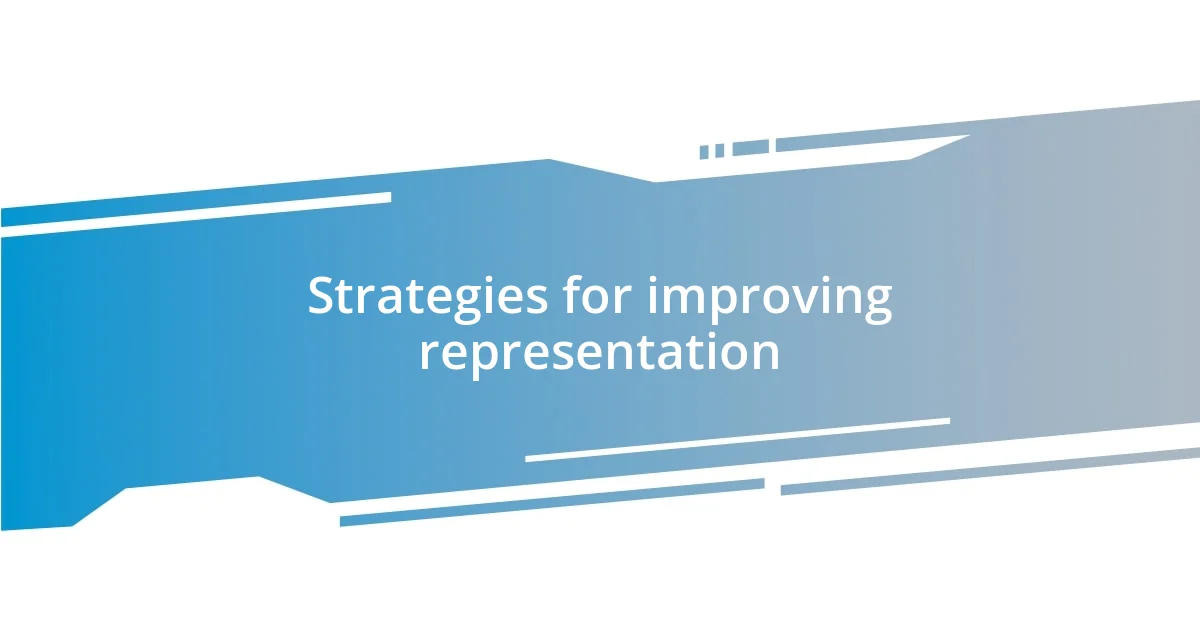
Strategies for improving representation
To genuinely improve representation, organizations can focus on inclusive hiring practices. I remember joining a team where the majority of my colleagues shared similar backgrounds, and it felt comforting yet limiting. When diverse voices are actively sought, it enriches the workplace with different perspectives and ideas, ultimately boosting creativity. How can we expect to connect with diverse audiences if those crafting the narratives don’t reflect that diversity?
Training programs aimed at bias awareness can also be pivotal. During a workshop I attended, we explored our unconscious biases in-depth. It was eye-opening and allowed for honest conversations about representation in our content. By fostering an environment where individuals confront their biases, organizations can create a culture of understanding and inclusivity. Have you ever thought about how many of your assumptions come into play during decision-making? Reflecting on this can catalyze meaningful change.
Moreover, supporting media that prioritizes diverse stories is crucial. I recall discovering a small independent film festival that showcased underrepresented filmmakers. It was inspiring to witness the creative talent that often goes unnoticed. When we advocate for and consume content that showcases diverse experiences, we’re not just enjoying art; we’re amplifying voices that deserve to be heard. Isn’t it our responsibility to ensure that all stories have a platform?
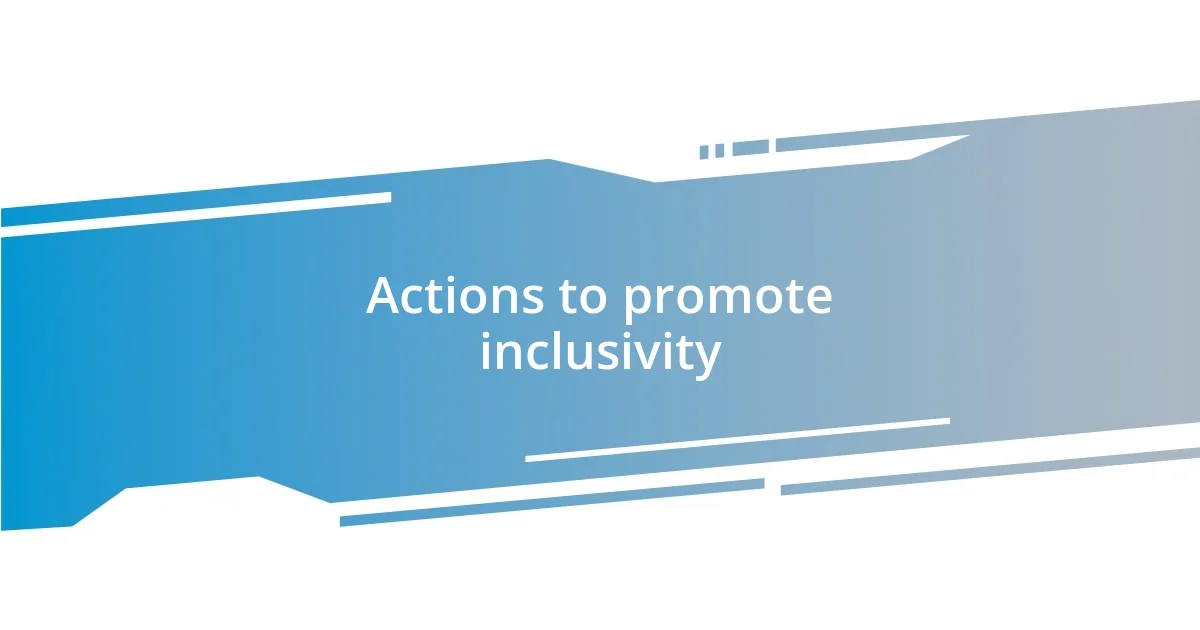
Actions to promote inclusivity
One effective action for promoting inclusivity is the establishment of mentorship programs aimed at underrepresented groups. I recall my first job where my mentor was a woman of color who guided me through the challenges I faced in a predominantly male environment. Through her support, I gained the confidence I needed to articulate my ideas and claim my space. Have you considered how mentorship can illuminate paths for those who feel unseen? It connects generations, helping to bridge the gap and foster a more inclusive atmosphere.
Hosting community events that celebrate diverse cultures can also make a significant impact. I remember attending a local festival where various ethnic groups showcased their traditions through music, dance, and food. The experience was electric! It not only deepened my appreciation for other cultures but also created a space for people to come together, share stories, and build new relationships. Isn’t it amazing how shared experiences can break down barriers and spark understanding?
Finally, amplifying the voices of marginalized creators within content is crucial for meaningful representation. I once joined an online platform dedicated to promoting indie writers, and it opened my eyes to stories I’d never encountered before. Seeing their passion and unique perspectives enriched my understanding of the world around me. Why should we limit our consumption to mainstream narratives? By actively seeking out and uplifting these voices, we not only broaden our horizons but help create a landscape where inclusivity thrives.
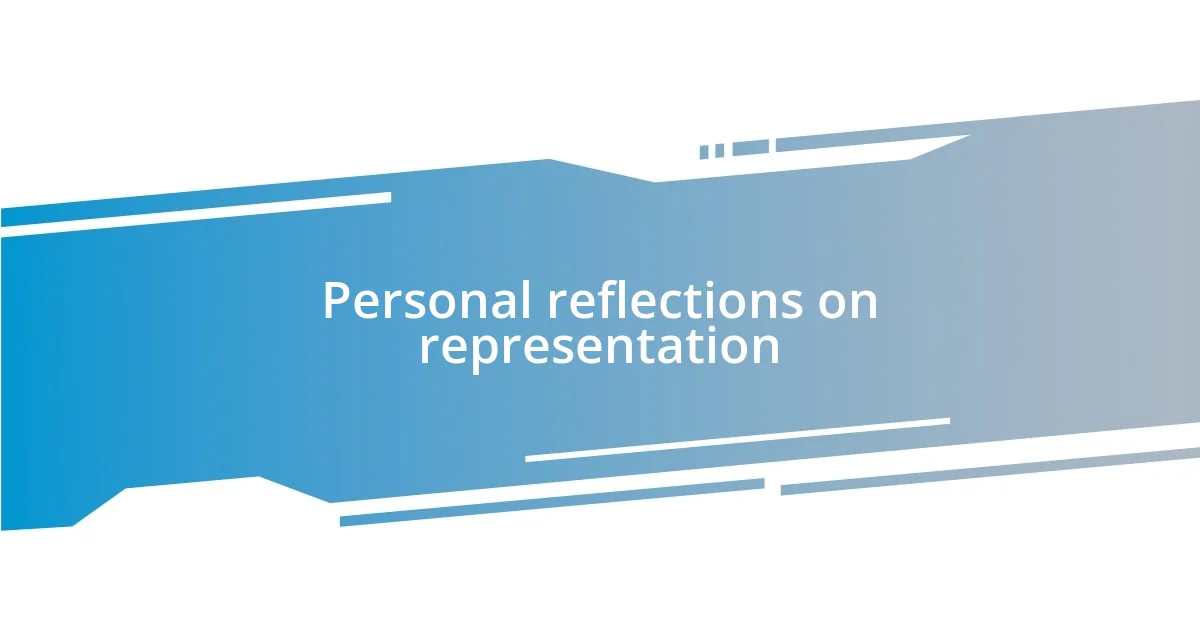
Personal reflections on representation
When I think about representation, I often reflect on my childhood experiences with media. Growing up, I rarely saw characters who looked like me or shared my background. This absence made me question my own identity and place in the world. It wasn’t until I stumbled upon a book series that depicted a protagonist who mirrored my experiences that I felt a sense of belonging. Isn’t it incredible how much stories can shape our self-perception?
I also remember a time when I was leading a project that involved creating content for a diverse audience. I quickly realized that my team lacked perspectives from certain communities we aimed to reach. After inviting a few guest contributors from those backgrounds, I noticed an immediate richness in our ideas and narratives. How often do we overlook the power of direct input from those we want to represent? It’s a reminder that authentic representation isn’t just about inclusion; it’s about actively listening and integrating those voices.
Hearing stories from friends who belong to different cultural backgrounds has profoundly impacted my understanding of representation. I recall a heartwarming evening spent with a friend who shared her family’s immigrant journey over dinner. As she spoke, I was captivated by the resilience and uniqueness of her narrative. It pushed me to think: what stories are we missing by not engaging with each other’s experiences? This realization fuels my passion for advocating for diverse representation in every sphere—because every voice deserves to be heard and celebrated.
